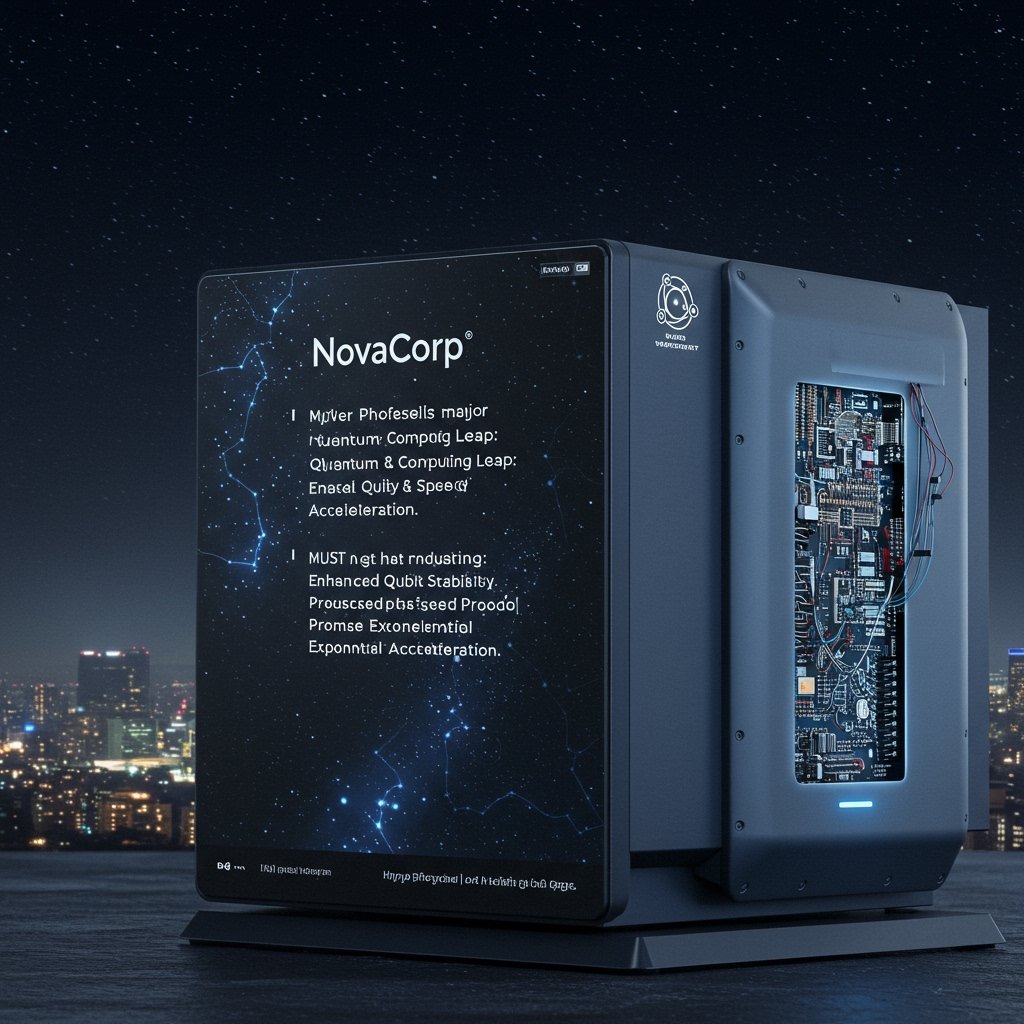NovaCorp Hosts Exclusive San Francisco Summit
San Francisco, CA – On June 5, 2025, tech titan NovaCorp convened an exclusive, invite-only summit at a private venue in the city, gathering a select group of its key investors and prominent industry leaders. The highly anticipated event served as the platform for the company to make a pivotal announcement regarding its ongoing research and development efforts in the cutting-edge field of quantum computing.
Quantum Computing Breakthrough Announced
During the summit’s centerpiece presentation, Dr. Evelyn Reed, the esteemed Chief Executive Officer of NovaCorp, took the stage to unveil what the company is hailing as a major breakthrough in quantum computing technology. The announcement centered around a novel, proprietary quantum architecture developed internally by NovaCorp’s research teams. This new architecture, according to Dr. Reed, addresses some of the most persistent and challenging hurdles facing quantum computation today.
Specifically, Dr. Reed detailed that the proprietary architecture has achieved significantly enhanced qubit stability and processing speed compared to previous designs, both internal and, implicitly, those currently available or widely discussed in the public domain. Qubit stability, a critical metric often referred to as coherence time, dictates how long a qubit can maintain its quantum state before succumbing to environmental interference (decoherence). Processing speed, while less straightforward to define in quantum terms than in classical computing, refers to the rate at which quantum operations can be performed and entangled states manipulated. By substantially improving both metrics simultaneously, NovaCorp claims to have unlocked a new level of performance and reliability for quantum processing units (QPUs).
Impact on Complex Simulations
The immediate and potentially transformative impact of this advancement, as highlighted by NovaCorp, lies in its ability to exponentially accelerate complex simulations. Many of the most computationally intensive problems in science and industry involve simulating the behavior of intricate systems at a molecular or atomic level. These simulations are crucial for understanding properties, predicting reactions, and designing new materials or molecules. Classical computers struggle immensely with such tasks as system complexity grows, often requiring months or even years for calculations that remain intractable within practical timeframes.
Quantum computers, utilizing principles like superposition and entanglement, hold the promise of tackling these simulations with unprecedented efficiency. However, current quantum systems are limited by the short coherence times and error rates of their qubits. NovaCorp’s claimed breakthrough in stability directly addresses the coherence problem, potentially allowing for deeper quantum circuits and more complex algorithms to be executed successfully. The enhanced processing speed, meanwhile, would reduce the overall time required for computation, moving quantum advantage closer to reality for these specific, high-value applications.
Applications in Drug Discovery and Material Innovation
Among the most cited beneficiaries of this accelerated simulation capability are the fields of drug discovery and material innovation. In drug discovery, quantum simulations could drastically speed up the process of modeling molecular interactions, predicting binding affinities, and understanding reaction pathways – tasks fundamental to identifying and designing new therapeutic compounds. This could potentially cut years off the traditional drug development timeline and significantly reduce costs.
Similarly, in material science, simulating the electronic and chemical properties of novel materials is essential for developing everything from high-temperature superconductors and advanced battery components to catalysts and semiconductors. NovaCorp’s technology could enable researchers to explore a vast landscape of potential materials and predict their properties in silico far more effectively than is currently possible, accelerating the design cycle for materials with tailored characteristics.
Initial reports circulating among attendees of the exclusive summit strongly support the significance of NovaCorp’s announcement. Feedback from investors and industry leaders present indicated a palpable excitement regarding the potential implications of the enhanced qubit performance for various computational challenges they face within their respective sectors.
Future Disclosures and Demonstrations
Looking ahead, NovaCorp outlined its plans for further disclosing the technical details of this breakthrough. The company confirmed its intention to release a comprehensive whitepaper later this year. This document is expected to provide in-depth scientific and technical specifications of the proprietary architecture, including specific benchmarks for qubit stability and processing speed that substantiate the claims made by Dr. Reed. Such a publication will be critical for the broader scientific community to evaluate the novelty and impact of NovaCorp’s work.
Furthermore, NovaCorp announced plans for a public demonstration of the technology, targeting the fourth quarter of 2025. This demonstration is anticipated to showcase the capabilities of the new QPU architecture in action, likely through the execution of specific quantum algorithms relevant to simulation tasks or other key problem areas. A successful public demonstration would serve as a powerful validation of the technology’s readiness and performance, further solidifying NovaCorp’s position at the forefront of the burgeoning quantum computing industry. The anticipation for both the whitepaper and the public demonstration is high, signaling a significant moment for NovaCorp and the quantum computing landscape as a whole.





